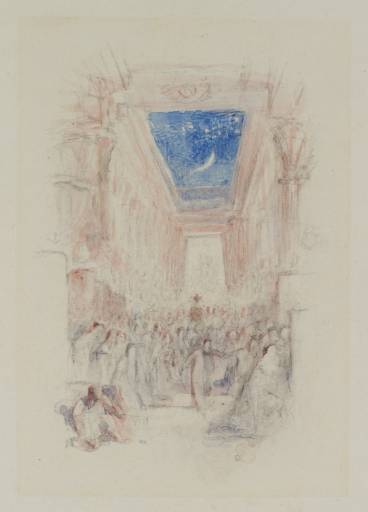Joseph Mallord William Turner Study for 'The Chaplet' for Moore's 'The Epicurean' c.1837-8
Joseph Mallord William Turner,
Study for 'The Chaplet' for Moore's 'The Epicurean'
c.1837-8
Joseph Mallord William Turner 1775–1851
Study for ‘The Chaplet’ for Moore’s ‘The Epicurean’ circa 1837–8
D27655
Turner Bequest CCLXXX 138
Turner Bequest CCLXXX 138
Pencil and watercolour, approximately 113 x 85 mm on three-ply laminated Foolscap Bristol drawing board, 221 x 213 mm
Stamped in black ‘CCLXXX 138’ bottom right
Stamped in black ‘CCLXXX 138’ bottom right
Accepted by the nation as part of the Turner Bequest 1856
Exhibition history
1975
Turner in the British Museum: Drawings and Watercolours, British Museum, London, May 1975–February 1976 (215, reproduced).
References
1909
A.J. Finberg, A Complete Inventory of the Drawings in the Turner Bequest, London 1909, vol.II, p.899, as ‘Interior of eastern palace, with figures’.
1975
Andrew Wilton, Turner in the British Museum: Drawings and Watercolours, exhibition catalogue, British Museum, London 1975, pp.110, 134, no.215, reproduced.
1993
Jan Piggott, Turner’s Vignettes, exhibition catalogue, Tate Gallery, London 1993, p.96, as ‘Study for “The Chaplet” ’.
1999
Peter Bower, Turner’s Later Papers: A Study of the Manufacture, Selection and Use of his Drawing Papers 1820–1851, exhibition catalogue, Tate Gallery, London 1999, p.121 note 1.
This sketch belongs to a large group of preliminary studies which relate to Turner’s vignette illustrations for John Macrone’s 1839 edition of Thomas Moore’s The Epicurean, a Tale: and Alciphron, a Poem. The study shares the same size, palette, and style as five other works in this group, suggesting that Turner produced them all at around the same time (see Tate D27647; Turner Bequest CCLXXX 130).
The subject of the work is an experimental design for The Chaplet, circa 1838 (untraced),1 one of four vignettes that Turner produced for Moore’s fantastical prose tale The Epicurean.2 The finished watercolour, engraved for publication by Edward Goodall, depicts the trial of Alethe, a former pagan priestess who after converting to Christianity, is forced to stand trial for heresy.3
Although her sentencing is delayed another day, the evil Orcus insists that she wear a coral chaplet that he has secretly poisoned:
The implacable Orcus, however, would not hear of mercy ... It was but by the firm intervention of the Governor, who shared the general sympathy in her fate, that the delay of another day was granted to give a chance to the young maiden of yet recalling her confession, and this affording some pretext for saving her. Even in yielding, with evident reluctance, to this respite, the inhuman Priest would yet accompany it with some mark of his vengeance. Whether for the pleasure (observed the Tribune) of mingling mockery with his cruelty, or as a warning to her of the doom she must ultimately expect, he gave orders that there should be tied round her brow one of those chaplets of coral, with which it is the custom of young Christian maidens to array themselves on the day of their martyrdom.
(Thomas Moore, The Epicurean, 1839, pp.205–6)
(Thomas Moore, The Epicurean, 1839, pp.205–6)
Despite his efforts, Alciphron is unable to remove the deadly band, and Alethe dies in his arms.
The sketch depicts the grand architecture of the great hall, the throng of spectators at the trial and the pale crescent moon glimpsed in the sky in the background. The general composition remained essentially unchanged in Turner’s final version of the vignette, although he would later fill the scene with a greater variety of female spirits and ghoulish figures.
Technical notes:
Like many of Turner’s studies for Moore’s The Epicurean, this sketch has been made on three-ply Bristol board, a type of board sold by most artists’ colourmen. The board has been laminated with handmade paper. Peter Bower has identified the maker as the William & Thomas Slade Mill, the papermakers who succeeded William Allee at Hurstbourne Priors Mill in Hampshire.1
Like many of Turner’s studies for Moore’s The Epicurean, this sketch has been made on three-ply Bristol board, a type of board sold by most artists’ colourmen. The board has been laminated with handmade paper. Peter Bower has identified the maker as the William & Thomas Slade Mill, the papermakers who succeeded William Allee at Hurstbourne Priors Mill in Hampshire.1
Verso:
Inscribed by unknown hands in pencil ‘133 | b’ centre right and ‘CCLXXX 138’ bottom centre and ‘D27655’ bottom right
Meredith Gamer
August 2006
How to cite
Meredith Gamer, ‘Study for ‘The Chaplet’ for Moore’s ‘The Epicurean’ c.1837–8 by Joseph Mallord William Turner’, catalogue entry, August 2006, in David Blayney Brown (ed.), J.M.W. Turner: Sketchbooks, Drawings and Watercolours, Tate Research Publication, December 2012, https://www

